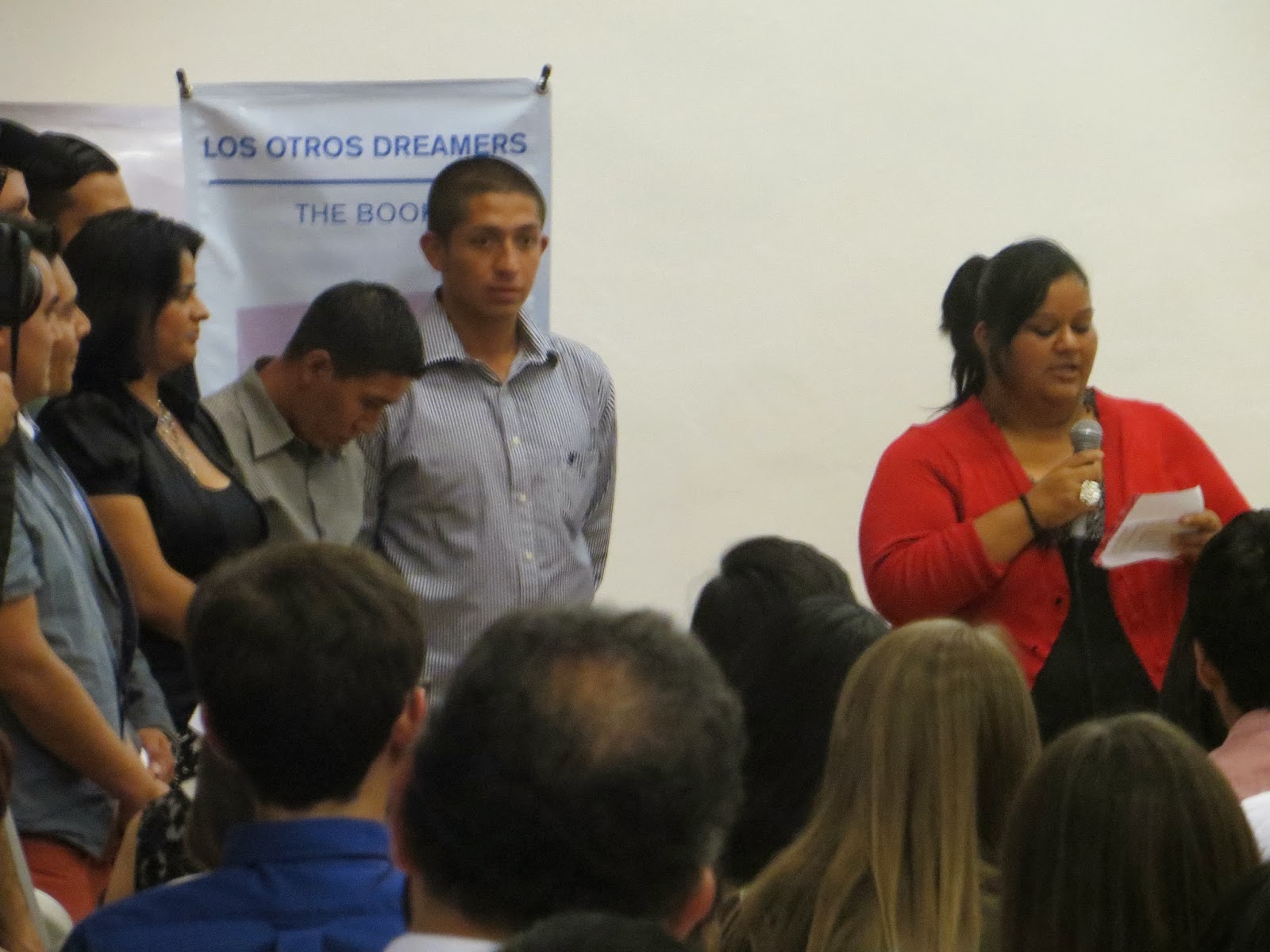by Maggie Ervin
It was standing room only, agonizingly hot, and we could barely see from the back. But we weren’t going anywhere. Gathered in one of the many beautiful museums in the ever-expanding metropolis known as Mexico City, we had come to hear dreams. Not to analyze them in a Freudian way or to go to some sort of mystical place of altered consciousness. No, this was all rooted firmly in reality. We had come to hear the stories of Los Otros Dreamers, the “Other Dreamers.”
Anderson
estimates that there are about 500,000 Dreamers who have returned to Mexico since
2005. [She defines a Dreamer as someone between 18-35 years who lived in the US
for five years or more, and who was either deported, voluntarily departed
(de facto deported), or chose to move back to the country where they were born.] Their reasons for returning to Mexico are
varied: to reunite with family, to seek educational opportunities denied them
in the US, exhaustion and frustration with the difficulties of living undocumented in the US, deportation (in many cases for minor infractions for
which a US citizen would only pay a fine, such as getting caught driving without a
license or drinking in public), among others.
The book is a multilingual experience. The Dreamers give their testimony in either English, Spanish or Spanglish, and each is translated into Spanish and English. Saul, Virginia and Rufino's testimonies are trilingual, as are they, and their testimonies are translated to the Mixe and Tzotzil languages. While the stories that appear in the book are as diverse as the stories of any group of 26 people, there are recurring themes around the experience of returning
to Mexico that many recount:
- The struggle to get proof of schooling in the US, which needs to be both notarized and translated in order to be valid in Mexico, and is required from all schools attended (elementary, middle and high school). More than a few of the featured Dreamers had to wait over a year to get these papers, and at great expense, frustration, and even humiliation (i.e., learning that the only way to get their transcripts from the US is to request them in person).
- The difficulty of getting a voter identification, the most basic document needed in Mexico to be able to rent an apartment, do a bank transaction, or even get a job.
- Language barriers, especially in the case of those who were taken to the US at a very young age.
- Not being fully accepted as Mexican by their compatriots.
- For those who were deported, being dropped off at the border with no one to counsel them or orient them, far from any family member, and at risk of being robbed. In the case of women, they’re often let go a few minutes before the men so they can get a head start and avoid risk.
- Separation from family that remain in the US, without the possibility of visiting them there or of their families visiting them in Mexico.
 |
| Border fence separating Nogales, Sonora from Nogales, Arizona |
Just this week came news of the 2 millionth deportation since Obama - sometimes called the "Deporter in Chief" - took office. 2 million is a huge number, and hard for some of us to conceive of in our minds. But it is these heart-rending details that bring to life the realities embedded in that number. Currently, a full one-quarter of all deportees are separated from their US citizen children, and more than half of deportees in 2013 were deported without a criminal conviction.
But it's not
all bleak. In their testimonies, some of the Dreamers write about being grateful to be in Mexico and being quite happy with their lives. Moy and Pedro Noé are thrilled to be studying dentistry at the National University. Maggie works hard to keep her parents' shop running. Saul is a silver level in Amway and is thoughtfully raising a son. Maru and Daniel dedicate themselves to Los Otros Dreamers Collective and Dream in Mexico, non-profits that support Dreamers. In fact, passive or resigned would be the last words I'd use to describe anyone in this book. These are young people whose dreams are many, and they're making them happen.
The problem is, of course, that despite being both "from here and from there," they can't go "there," where they still have friends, families and a rich history. As Pamela writes, "Now, I feel like I was always Mexican...You don't have to tell me. I know it. And do I feel American? I don't even know what I am, but I know I'm both at the same time. I can't ignore my whole life."
Where to buy Los Otros Dreamers book:
dreaminmexico.org/?page_id=207 (all profits go to Dream in Mexico)
dreaminmexico.org/?page_id=207 (all profits go to Dream in Mexico)
Where to attend a Los Otros Dreamers book event:
- October 13th, 7 pm: Foro de la Galería "La Capilla del Arte", 2 norte número 6, Centro Histórico, Puebla, Puebla, Mexico
- Coming soon to Los Angeles, Chicago, NYC and Washington. Stay tuned at https://www.facebook.com/OtrosDreamersTheBook.







No comments:
Post a Comment